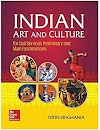Dowry and Surrogacy
"I measure the progress of a community by the degree of progress which women have achieved"
Dr. B.R. Ambedkar
Dowry - The amount or property given by bride's family during marriage is termed as dowry.
Issues with respect to dowry -
- Acceptance of culture of dowry both by men and women.
- Consumerist culture (consuming/owning everything based on the capacity not on needs) has increased the incidences of dowry.
- Lack of eye witness.
- Dowry is treated as in investment (give and take culture).
- It is associated with the social prestige of the family in the society.
IPC Section 498A -
- It deals with the cruelty of husband and the relatives on the women.
- It made the offence non-bailabe and cognizable (i.e., suo moto arrest can happen without the order of the magistrate) and non-compoundable (i.e., out of court settlement is not possible).
- In Rajesh Sharma case, the provision was diluted however it met with serious criticism and the judgement was overturned.
- Currently, provision of immediate arrest has been resorted. The offence is cognizable and non-bailable.
- High Court has the power to settle the issue amicable (i.e., it is now compoundable but only by a High Court).
- The provision for red corner notice has been diluted and recovery of dowry items for granting the bail is no longer mandatory.
Way forward/Suggestions -
- Naming and Shaming (which will help in changing the mind set).
- Financial independence of women.
- Civil societies should come forward to create sensatisation.
- Promoting the concept of Aadarsh marriage (ideal marriage).
- Concept of mass marriage should be promoted.
- Walking the talk, i.e., not only make provisions but also implement it in spirit.
- The men should also come forward against dowry system.
- Concept of neighbourhood committees need to be promoted.
Surrogacy - It is an arrangement where a surrogate mother bears and delivers child for another couple.
According to Confederation of Indian Industry (CII), surrogacy industry constitutes $2.3 Billion industry.
Issues with respect to surrogacy
- Denial/Discrimination of surrogate mother with respect to financial, health and post-natal rights are the main issues faced by surrogate mother.
- Abandonment of surrogate child in context of child with disability/unplanned twins/girl child.
- With respect to international parents, the rights of child is compromised if their respective country does not recognise surrogacy. For example - China
- Ethical perspective - Infertility in India is a taboo, hence it is considered that it is a moral duty to alleviate the curse of infertility. However, on the other hand, it de-personalises the process of reproduction.
Provisions of Surrogacy bill
- Commercial surrogacy is banned, only altruistic surrogacy is allowed.
- Conditions for the Intended parents - Married, Proven infertility, Indian Citizens/Person of Indian origin, wife should be in the age of 23 years to 55 years and they should not have any surviving child whether adopted or biological.
- The condition does not apply to the child who is unfit wither physically or mentally.
- The divorce or the widow in the age of 35 years to 45 years can also avail surrogacy.
- Conditions for surrogate mother - Any willing women, married, in the age group of 25 years to 35 years, atleast one healthy child, can be a surrogate mother only once and should possessed the certificate of fitness.
- There is a provision for state and national surrogacy board for -
- Regulation of surrogacy clinic
- Recommending modification
- Enforcing standards
- Investigating breach of provision
- The proposed insurance cover for the surrogate mother has been increased from 16 to 36 months.
- Surrogate mother has the option to withdraw from surrogacy before the embryo is planted in her womb.
- Abortion of surrogate child requires the permission of surrogate mother and appropriate authority and it should be complaint with medical termination of pregnancy (MTP) Act.
Analysis of Surrogacy bill
Positive analysis -
- It will promote the culture of adoption (as commercial surrogacy is banned and many restrictions will be imposed).
- It will protect the rights of surrogate mother and child.
Negative analysis -
- It does not recognise the modern day reality as transgender, fertile couple, live-in partners, homosexuals are not included as intended parents.
- When such economically flourishing industry is banned, it makes it underground and further aggravates the vulnerability of both the surrogate mother and child (Regulation is the need of the hour not ban).
- It fails to recognise the livelihood concerns of women who are involved in surrogacy business.
- According to NCW, altruistic surrogacy is compromising the economic rights of the surrogate mother.
Question for practice
- Surrogacy has become both a need as well as the source of income for many. In the context of the statement, discuss to what extent putting a blanket of ban on commercial surrogacy is justified.
- On one hand violence against women justifies strong laws, on the other hand such laws are misused by few women. Discuss the reason behind this state of affair.
Reason for misuse of Violence against women act/Domestic violence act
- Lack of gender neutral laws.
- Vengeance against years of male domination.
- Moral degradation of society.
- Corruption of value system.
- Decline in religious aspect of marriage as an institution (secularisation of marriage).
- Consumerist tendency → Monetary benefits
- Social sympathy with the women (gender stereotyping) - Due to gender stereotyping the social perception of women is abla and can never do wrong has been misused by many women.
- Lack of organisation to safeguard the rights and interests of men.
- To settle personal scores.
Previous Article - Violence against women
Next Article - Diversity in India
Notes on other subjects
Optional Subject
Note - This is my Vision IAS Notes (Vision IAS Class Notes) and Ashutosh Pandey Sir's Public Administration Class notes. I've also added some of the information on my own.
Hope! It will help you to achieve your dream of getting selected in Civil Services Examination 👍


.png)



0 Comments